
Did you know that “67% of consumers consider a responsive business more trustworthy?” (Sprout Social) and “53% of consumers prefer to talk to a real person when resolving a customer service issue?” (SuperOffice)? So what’s the key takeaway here? Yes, you got it right- Your Business Phone Number holds a huge profit potential! Remember when you called a business and only heard endless ringing? Whether you are a startup, a solopreneur, or an already established business, you can’t let your precious customers go away just like that. You need a professional business phone number to project a solid image in front of your customers. Wait, don’t make the mistake of using a personal phone number for professional purposes. Trust me, it will trouble you a lot. Now you may be curious about how to get a business phone number. This article will be your guide to getting that perfect business phone number so that your business thrives in 2025.
Let’s begin to level up your phone number game!
What is a Business Phone Number?
A business phone number is a dedicated phone line that enables companies to communicate with customers, clients, partners, and others for business purposes. Being specifically designed for work-related calls, business phone numbers help companies maintain a clear separation between personal and professional work. You can think of a business phone number as a direct link from where your customers can reach you.
Types of Business Phone Numbers
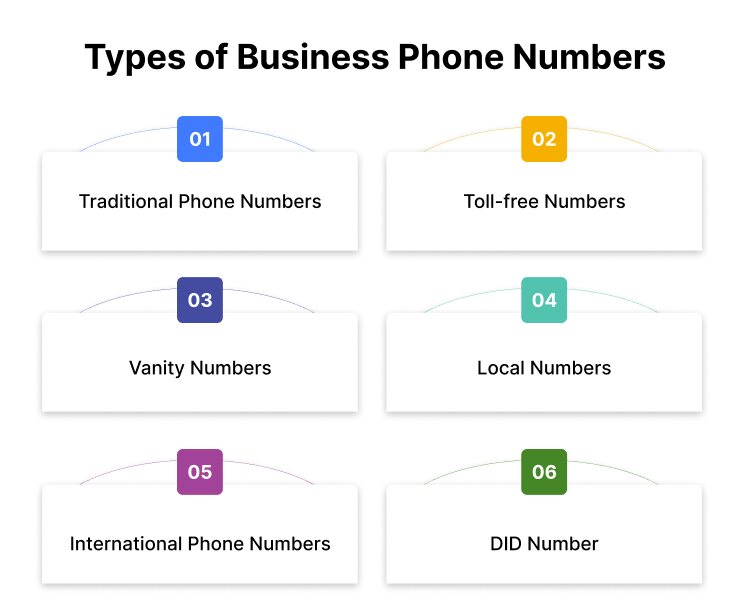
Insight: The first assigned telephone number (which still exists to this day) is Pennsylvania 6-5000 3
To decide upon a number that best suits your business needs and learn about how to get a business phone number, it is important to understand the various options you have. Let’s take a look:
Traditional Phone Numbers
Traditional landline numbers are associated with a specific physical address or location. For the last few decades, these numbers have been the primary means of communication, before the internet technology came in. Traditional setups use copper wires to connect with a local telephone service provider. Being tied to a physical location, these numbers offer limited flexibility as compared to modern-day alternatives. When it comes to scalability, additional hardware is required for expansion. Traditional Phone lines are suitable for businesses that require a stable and fixed phone connection and mobility is not their primary concern.
It is important to learn that traditional phone numbers are now a thing of the past and their modern alternatives i.e. Virtual Phone Numbers have grabbed the spotlight. Below, we are going to explain the different types of virtual phone numbers, one by one.
Toll-free Numbers
Ever dialed a business phone number that begins with 1-800? That’s what Toll-free numbers look like. Such numbers are an excellent opportunity for businesses to build an established and trustworthy image. This is because when customers dial toll-free numbers to connect with a business, the charges for the call are borne by the business and not the customers. This means that customers can connect with your business without worrying about the call charges. Some other commonly used prefixes for Toll-free numbers are 888, 877, 866, 855, 844, and 833
Fact: A toll-free number can be a local number, international or vanity number.
Vanity Numbers
For businesses with more focus on brand recognition or those who want to stand out in a highly competitive market, Vanity Phone Numbers are an ideal option. These numbers are easily memorable as they can be customized. A vanity phone number can be in the form of words or phrases that are relevant to the business. For example, a toll-free vanity phone number can be like 1-800-SALON for a business that offers salon services.
Local Numbers
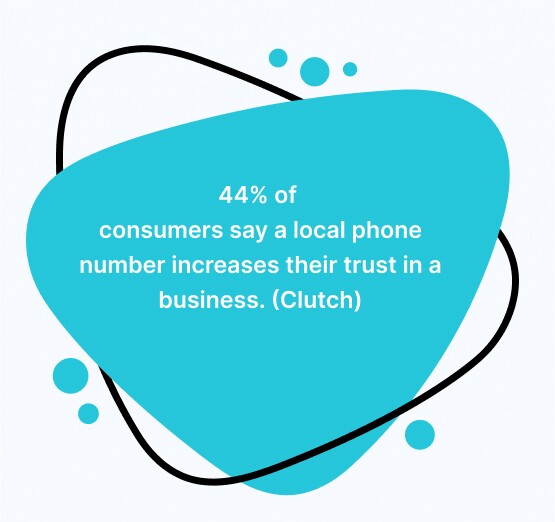
As the term suggests, these phone numbers are an ideal option for businesses looking forward to boosting their presence in a specific area or location. Local phone numbers start with an area code of a specific physical location which can be a city, state, or county. With familiar area codes, customers build trust in the business. Moreover, receiving calls from local phone numbers customers are more likely to answer.
Suppose, a business has a customer base in Los Angeles, California then they should select a local phone number with area codes starting with 213. Businesses can purchase multiple virtual local phone numbers to establish their presence across different locations in the country.
International Phone Numbers
These virtual phone numbers, as the term suggests, are suitable for businesses that have customers across different countries. Just like a local number establishes a local presence within the country, international phone numbers help in establishing a local presence across different countries. These phone numbers start with country codes specific to the location. International calls are usually charged at the per-minute rate of the destination country.
DID Number
Using a Direct Inward Dialing Number or DID number, customers can directly connect to a phone extension such as a customer care agent. With this, callers can bypass the IVR call menus, thus saving time. DID phone numbers are useful for businesses that receive a high volume of incoming calls daily.
How to Get a Business Phone Number?
Your roadmap to “how to get a business phone number that’s perfect for your needs” consists of 3 major steps as mentioned below:
-
Choose the Right Business Phone Number Provider
Your first step to get a business phone number is to choose a reliable business phone number provider. A VoIP provider can provide you with a dedicated business phone number along with several advanced features and competitive pricing.
-
Look for a Suitable Phone Number
If you have a preference for a business phone number with a specific sequence of digits, you will need to check its availability. Your VoIP provider can provide you with a searchable database where you check availability for your desired business phone number. In case the desired phone numbers are already occupied, you can check for similar alternatives.
Start by getting a local phone number for the area where your business operates. If in case you want to port your existing phone numbers, let your provider know.
-
Sign Up and Purchase Your Business Phone Number
Once you sign up with a reliable phone number provider, your next step could be to check their phone number plans. Each plan will offer its own unique features and cost. You can choose the plan that fits best your requirements. To purchase a phone number plan, you must fulfill the payment criteria which usually include entering your credit/debit card details and selecting the billing cycle, whether annual or monthly.
-
Set Up Extensions and Other Phone Features
Now you need to decide where you want to direct your calls. As a business, you must have different departments like sales, support, etc. You can set up extensions for different departments or even employees. This helps efficient routing of incoming calls and also helps customers reach the right agent or department quite quickly. In case you are a small business or a solopreneur with no real departments, you can still create extensions for different departments. This will be extremely helpful for you in knowing the intent behind the incoming calls and serving each call most appropriately.
-
Start Using Your Business Phone Number
Once everything is set and done, it’s time to begin using your business phone number. You can make and receive calls as well as update features. In case you need additional business phone numbers, you can easily purchase from your VoIP provider’s website.
Well, now you have learned about how to get a business phone number, it would be wise to know more about these numbers. So let’s continue with the reading!
Features of Business Phone Numbers
Do you know the best part of using business phone numbers? It’s the myriad of features offered by these phone numbers. It is these features that define the functionality of the business phone numbers. Let’s take a look:
- Call Forwarding: Call Forwarding is rerouting the incoming calls to another phone number.
Example: A sales manager who is on a business trip forwards all calls to his assistant’s number so that no client calls are missed.
- Auto Attendant: It is the automated call answering system that assists callers to the right destination.
Example: An auto attendant presents callers with different menu options such as sales, support, technical, etc., thus reducing call wait times.
- Custom Greetings: Personalized greetings set the tone for your brand. These greetings welcome the callers with personalized voice messages.
Example: A personalized voice message that thanks the callers for connecting with your business and a little about your core service offerings serves a positive first impression.
Bonus Tip: During the festive season, update your voicemail and auto attendant greetings to add festive cheer to your communication with customers.
- Intelligent Call Routing: Incoming calls are routed to their destination based on various parameters such as time of the day, caller ID, agent availability, and caller preferences.
Example: Premium customers are automatically directed to their dedicated account managers, thus ensuring prompt and personalized service.
- Call Queue
When lines are busy, incoming calls are placed in virtual queues to prevent sudden call dropping. Callers are informed about their queue position and estimated hold time to reduce frustration.
Example: When incoming call volume is high, callers in a virtual queue hear hold music and their estimated time to talk with a live agent.
Bonus Tip: Add a “Thank you for choosing us” message when ending calls. It leaves a positive impression on the customers.
- Call Recording
Phone conversations between callers and agents are recorded automatically for quality, training, and compliance purposes.
Example: Call recordings can be used to train new agents and even in case of dispute resolution.
- Video Conferencing: Enables virtual face-to-face communication with clients, colleagues, and partners connecting from different locations.
Example: Virtual meetings can be conducted easily eliminating travel costs and scheduling issues.
- Voicemail Transcription: Voicemail messages are converted into text so that users can easily review and manage them.
Example: Transcribed messages can be read on mobile phones thus having easy access to important client messages.
- Reports and Analytics
Helps in improving business communication strategies by providing insights about call volume, caller preferences, average wait time, etc.
Example: Managers can analyze reports to identify peak call volume time and set the distribution of resources accordingly.
- Mobile App

Enable users to use their business phone number features like voicemail, video calling and conferencing, call forwarding, etc., from their mobile devices.
Example: Business communication can be managed easily when you are on the go.
Benefits of Business Phone Number
-
Builds a Professional Brand Image and Enhances Credibility
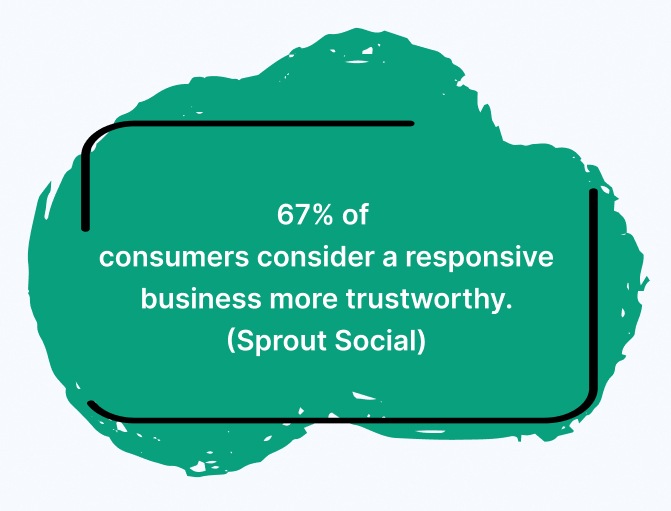
A company with a dedicated business phone line looks more legitimate and credible to the audience than one that uses a personal phone number. It’s a sign of commitment to customer service. Adding your professional phone number across all marketing materials can significantly enhance your brand visibility.
-
Separate Personal and Business Communication
A business phone number allows companies of all sizes and solopreneurs to maintain work-life balance. They can keep their business conversations separate from personal messages. This not only reduces stress but also fosters professionalism.
-
Expands Reach and Customer Convenience
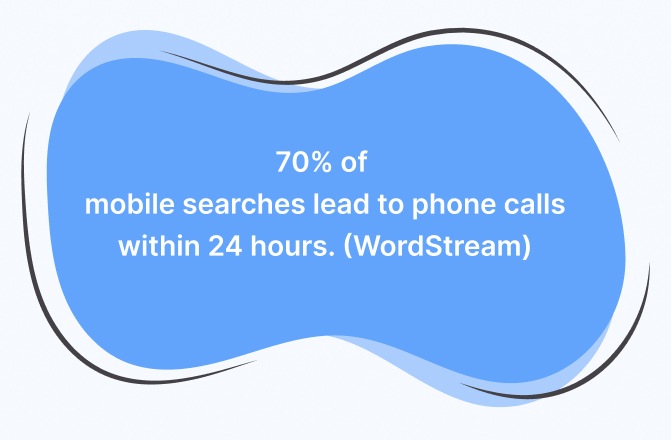
A dedicated business phone number makes it easy for customers to connect with you. Furthermore, business phone numbers like toll-free numbers make it even easier for customers to reach your business as they don’t need to incur call charges.
Signs You’re Ready for a Business Phone Number
Want to know what’s the best time to get a phone number for your business? It’s as soon as you start a business. If in case you have been running a business for a while now, but haven’t got any business phone number, then wait no more. Just get the ideal phone number as soon as possible.
There are several signs to tell you that you need a professional business phone number. Here are some common indications:
- Your business card or website displays your contact number
- Your business calls are often interrupted by personal calls and vice versa
- Clients expect more professional communication channels like phone numbers from you
- You are not able to track missed calls or call patterns
- You are still relying on emails and text messages for client communication
- Customers struggle to reach you leading to negative reviews
- Your business is growing and you need advanced phone features such as call forwarding, voicemail, call recording, etc., which you don’t have currently
Best Business Phone Number Provider
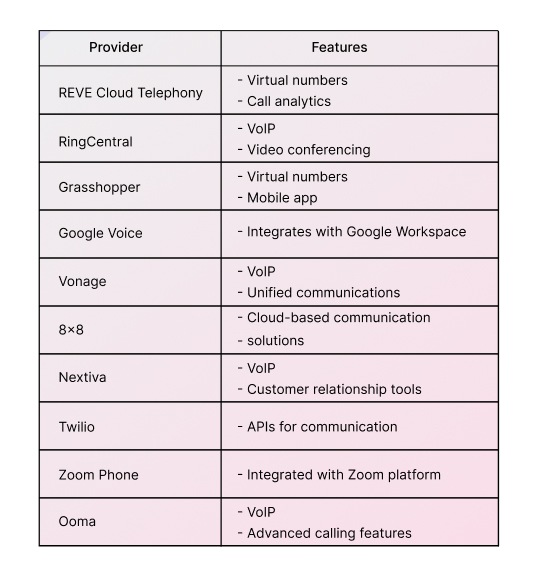
Best Practices for Choosing a Business Phone Number
Your business phone number is not just a bunch of digits but a reflection of your brand. Whether you are a solopreneur or a business with more or less number of employees, you need that perfect phone number for your business, right? To help you with that, here are the best useful practices for choosing a business phone number:
Match it with your Business Size
The size of your business greatly determines the type of business number you should use. Here are some examples:
- For startups, local phone numbers are an ideal option
- Small to Medium-sized businesses can use Toll-free numbers
- For businesses that want to outstand tough competitors, Vanity numbers can be of great help
- For organizations that deal globally, international phone numbers are suitable
Make it Memorable
You can choose a number that is easily memorable like phone numbers with repeating digits, easy-to-remember sequences, etc. In the case of vanity numbers, choose words or phrases that sound easily pronounceable.
Align it with Your Audience
When choosing local phone numbers, choose an area code that your local target customers can recognize easily. To establish your national reach, toll-free numbers are a good option.
Consider Scalability and Flexibility
Opt for a business phone number that allows scaling to match your growing business needs. In case you want to retain your existing landline phone numbers, consider a provider that offers portability.
Bonus Tip
Ask your Team: It’s a good practice to take input from your employees, and colleagues to suggest the best business phone number. You can even conduct customer surveys.
Be Creative
When choosing a vanity phone number, you can go for creative prefixes to make your number more memorable.
Test it Out
Call your friends, and colleagues from your business phone number and see whether they can recognize and memorize it.
Conclusion
A professional business phone number is a powerful tool to connect with customers, build trust, and drive success – it’s your professional lifeline. Use the tips provided in this blog when working on how to get a business phone number. For any kind of assistance on business phone numbers, you can get in touch with our industry experts. Stop procrastinating and get ringing!




























